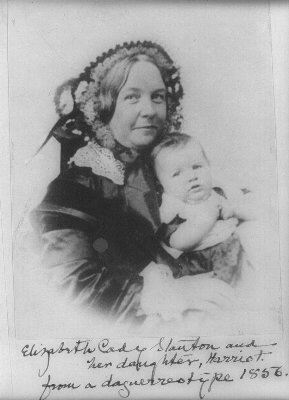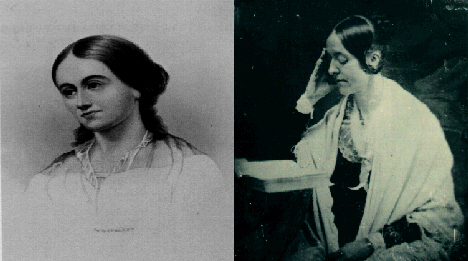
ECS and Daughter Harriet
LITR 4232:
American Renaissance
Student Presentation Summary
Tuesday, 11
February 2003: Sarah Margaret Fuller (intro, 1626-28): from Woman in the
Nineteenth Century, 1631-1641: Elizabeth Cady Stanton, 2038-44.
Reader: Laurie Eckhart
Discussion notes: Jennifer M. Davis
In this presentation the focus
is on:
Objective Three:
To use literature as a basis for discussing representative problems and subjects
of American culture such as... the writer’s conflicted presence in an
anti-intellectual society.
Summary:
Waging an intellectual battle
on a field that not only questions your right to be present, but also scorns
your very ability to think would beat down all but the most resilient of
contenders. Not so very long ago women began asking difficult questions that
have yet to be fully resolved. Speaking up for your rights today, in an
intellectual setting such as a university, is peanuts compared to what women
like Elizabeth Cady Stanton and Margaret Fuller faced during their time. Imagine
giving a speech for women's equality and rights...in a country were female
genital mutilation is still practiced... or a place where a woman's father still
has to produce X number of pigs to make marriage to his daughter appealing.
Elizabeth Cady Stanton
“…was reminded often that
sons would have been more welcome in her family than daughters.” She was an
assistant in her father’s law office. She was exposed to cousins who were
“committed anti-slavery activists” (2039)

ECS and Daughter Harriet

Elizabeth Stanton's Seneca Falls Home
"A mind always in contact with children and servants, whose aspirations
and ambitions rise no higher than the roof that shelters it, is necessarily
dwarfed in its proportions."
"I suffered with mental
hunger, which, like an empty stomach, is very depressing" (2040). Elizabeth
C. Stanton
Sarah Margaret Fuller
Fuller’s
father was disappointed she wasn’t a boy. “…he gave her the same education
as any young man of their class might have received.” (1626)
“If men look straitly to
it…” (1638) A simple appeal to common sense and reason.

Let it not be said, whenever
there is energy or creative genius, "She has a masculine mind" (1641).
"I now know all the
people worth knowing in America, and I find no intellect comparable to my
own."
Kate Payne in 2002
Kate brought up the case of
Miranda. She points out that Miranda is a woman with a background very similar
to that of Margaret Fuller. It appears that Fuller respects her, "Of
Miranda I had always thought of as an example..." (1640). I believe Fuller
is referring to the fact that Miranda's father treated her as an equal and she
grew up in an environment not devoid of intellectual stimulation or respect. She
was, "called on [for] her clear judgment, for courage, for honor and
fidelity..." (1639). Miranda is an example of best-case scenario to Fuller
because she didn't live in the intellectual vacuum of never to be tested theory.
Objective 3:
(emphasis) the writer’s conflicted presence in an
anti-intellectual society
Question 1:
When Fuller said, “I now know all the people worth knowing in America, and I
find no intellect comparable to my own” was she being egotistical?
Doug – No, she can’t
find anyone else with her ideas concerning women
Sara – As a woman, you
have to do twice as much work for the same result
Deterrean – There is an issue
of class, not egotism. But, she is
aware of her place in society. She
is a second-class citizen in first class position.
Dawn – She is seeking a
forum in which she can speak.
Dr. White – It’s difficult to find what to say to people that is acceptable to everyone. They're almost having to fight their way out of the situation.
Question 2:
Sandra – I am reminded
of women in the Middle East and how they are repressed.
The only place they can discuss their issues is behind men – there is
no place to be able to discuss the issues.
We now have a forum, but we take it for granted.
Simone – She’s craving
intellect, but she feels she is missing out.
She feels empty inside.
Deterrean – We have a
great privilege and opportunity to sit in a class and discuss complex, difficult
subjects in a way that allows us to encounter the subjects.
Question 3:
Do you think their writings were a good forum to express their issues?
Doug – Yes, with the
hope that someone would eventually be able to do something one day about what
they wrote about. Even more
frustrating is the fact that you find people who are intellectual, but still
don’t understand.
Deterrean – They had a
love of reading and language. She
was privileged to be able to read.
Dawn – The people
especially had a love of ideas.
Simone – They had a lot
to talk about. They did it on paper
with nothing to loose and with hopes that something comes of it.
Deterrean – Their words were transforming. They had power through their words.